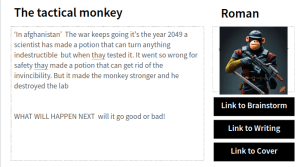SSR selfie
- Author By pbsromanh
- Publication date February 27, 2024
- Categories: Hanga | Create
- No Comments on SSR selfie
there is a lot of times we will need this
This week in PB4L we made A poster on how to ask for help and i made 3 ways to ask for help
@ Hoyts Cinemas we had the 16th film festival there were alot of movies played my favourite movie was Staying connected https://gbscardellt.edublogs.org/2023/11/08/staying-connected/ thats the link to it go watch it well you are there leave a nice comment for them to read.

This week we made a blurb for a narrative story we are going to publish.
‘In Afghanistan’ The war keeps going. It’s the year 2049 and a mad scientist has made a potion that can turn anything indestructible. But when they tested it, it all went so wrong. For safety they made a potion that can get rid of the invincibility. But it made the monkey even stronger….WHAT WILL HAPPEN NEXT? Will they find the cure? Or will the indestructible and invincible monkey run free…?
Today be were learning To subtract Using place value in hundrids